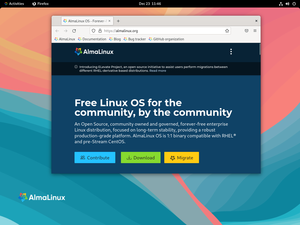 Screenshot of default desktop on AlmaLinux version 9.1, showing AlmaLinux homepage in Firefox. | |||||
| Developer | The AlmaLinux OS Foundation | ||||
|---|---|---|---|---|---|
| Written in | C (kernel) | ||||
| OS family | Linux (Unix-like) | ||||
| Working state | Current | ||||
| Source model | Open source | ||||
| Initial release | 30 March 2021 | ||||
| Latest release |
| ||||
| Repository | github | ||||
| Marketing target | Servers, desktop computers, workstations, supercomputers | ||||
| Update method | DNF | ||||
| Package manager | RPM | ||||
| Platforms | x86-64 AArch64 ppc64le s390x | ||||
| Kernel type | Monolithic (Linux kernel) | ||||
| Userland | GNU | ||||
| Default user interface | GNOME Shell, Bash | ||||
| License | GPLv2 and others | ||||
| Preceded by | CentOS | ||||
| Official website | almalinux | ||||
AlmaLinux is a free and open source Linux distribution, developed by the AlmaLinux OS Foundation, a 501(c) organization, to provide a community-supported, production-grade enterprise operating system that is binary-compatible with Red Hat Enterprise Linux (RHEL). The name of the distribution comes from the word "alma", meaning "soul" in Spanish and other Latin languages. It was chosen to be a homage to the Linux community.[1]
The first stable release of AlmaLinux was published on March 30, 2021,[2] and will be supported until March 1, 2029.[3] AlmaLinux is built using publicly-viewable and reproducible methods using the AlmaLinux Build System (ALBS), which is a customized build system whose source code, like the distribution itself, is publicly distributed and licensed under open-source licenses.
- ^ "FAQ | AlmaLinux Wiki". wiki.almalinux.org. Retrieved 2021-06-20.
- ^ Vaughan-Nichols, Steven J. (March 30, 2021). "CloudLinux Launches AlmaLinux, CentOS Linux clone". ZDNet. Retrieved April 22, 2021.
- ^ "Release Notes | AlmaLinux Wiki". wiki.almalinux.org. Retrieved 2022-12-12.